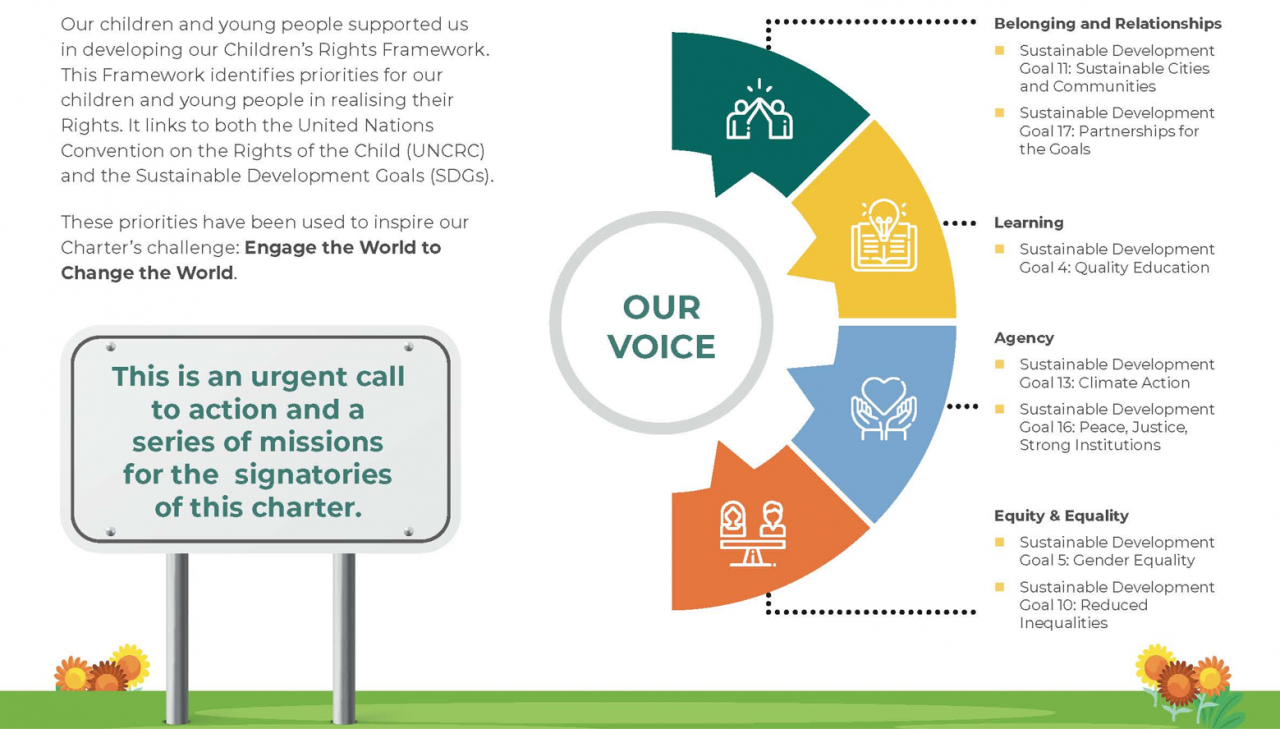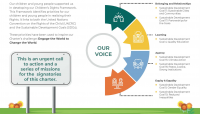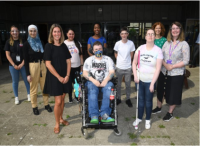
Race to net zero and climate resilience: localising the SDGs through meaningful participation and co-creation.
Glasgow started on its journey towards becoming one of the most sustainable cities in Europe in 2010, with the publication of the Sustainable Glasgow Report including 33 action to support the city in reducing its carbon emissions by 30% by 2020. The city set up the Sustainable Glasgow Partnership in 2010 and achieved their reduction target ahead of schedule.
In 2016 the city’s Education Services started teaching children and young people about the UN SDGs, localising them, building capacity and enabling local participation.

In 2019, the city declared a climate and ecological emergency, developing a climate plan aligned with the UN SDG’s and the wedding cake model. The plan has just transition and sustainable development at its heart. As part of the plan, the City committed to working with local communities and stakeholders to localise the 2030 agenda and 17 UN sustainable Development Goals. This includes improved and effective meaningful participation which aims to support an integrated sustainability approach to respond to Glasgow’s environmental, social and economic challenges.
To achieve Glasgow’s vision of becoming a just, net zero carbon and climate resilient city by 2030 it is essential that we work in collaboration with our communities, our institutions, and our people to promote effective co-design, co-development, transparent delivery and monitoring of sustainability decision making and climate action.
Glasgow identified five key thematic areas to help achieve our vision and deliver on the Global Goals:
- Communication and Community Empowerment

- To develop a dynamic Climate Change Communications strategy for the city.
- To engage in a series of climate conversations across the city. Fostering community confidence, empowerment and participation using the Place Standard tool and participatory budgeting.
- The Council develops opportunities, as part of the Curriculum for Excellence, for all education establishments to access outdoor sustainability learning, including outreach biodiversity work.
- Just and Inclusive Place
- Set up Glasgow's Just Transition Commission to ensure the burden of climate impacts is shared equitably and that all in Glasgow have equitable opportunities of access and success in our low carbon economy.
- Implement the Fairer Scotland Duty in decisions and actions made in response to the Climate Emergency, ensuring that strategic decision-making helps to tackle socio- economic inequality by following Fairer Scotland Duty’s guidance for public bodies.
- Well Connected Thriving City
- Deliver heat and energy generation projects including distribution of heat from parks in Glasgow based on existing feasibility studies.
- Develop a Carbon Neutral Innovation District in the GCID. This will act as a catalyst and exemplar for rolling out across the city.
- Deliver a comprehensive active travel network, incorporating the spaces for people measures (following consultation) and enabling 20-minute neighbourhoods through the liveable neighbourhoods’ plan.
- Health and Wellbeing
- Develop Urban Woodland Strategy for the city, including investment in protection of existing trees.
- Accelerate Implementation of the Glasgow and Clyde Valley Blueprint for a Green Network to create green & biodiversity corridors in the city by improving open space provision and increasing tree cover, while also providing opportunities for active travel corridors.
- To continue to invest in the school estate, for both carbon reduction, biodiversity gain, reduce flood risk and climate education as core principles.
- Green Recovery
- Identify and utilise Vacant and Derelict Land for greening and rewilding in combination with renewable energy generation measures and reducing flood risk.
- Support new and further extensions to Local Nature Reserves in the city, protecting existing sites and enhancing biodiversity and habitat connectivity.
- Increase investment in peatland restoration in the city region to enhance biodiversity and increase capacity for carbon sequestration.
- To fund accelerated implementation of the Glasgow Local Biodiversity Action Plan, Open Space Strategy Delivery Plan and Pollinator Plan.
All themes are intrinsically linked to theme 1 - effective communication, capacity building and meaningful participation, of both city council staff, elected members, city stakeholders and most importantly communities. People and communication being at the heart of the city’s climate plan approach.
Theme 1 - Communication and Community Empowerment 
- Climate Literacy Training – aimed at elected members, senior management, and city council staff. This includes information about UN SDG’s and in particular the wedding cake model, living within planetary limits and with a specific focus on SDG 13.
- Communications Campaign, deliberative processes, and Community engagement – The city council are working on a series of participation events with the aim of both building capacity and raising awareness, but also enabling participation and building trust with communities in relation to the 2030 agenda and the sustainable development goals.
- The city and partners have undertaken several climate conversations/ climate cafes with friends of parks groups, families, and young people. With the aim of encouraging deliberative processes.
- The city council also ran a Citizens assembly in the summer of 2021, publishing the assembly’s
recommendations in November 2021. The assembly
- In addition to this, the city worked with NESTA, Shared Future and local young people,
including disabled young people to raise awareness of SDG 13 and its links to others
sustainable development goals, but also to enable them to influence decision
making and meaningfully participate in municipal policy making, this was done via Legislative theatre. After taking part in this process, the young people went on to participate in other events and seminars to share their views on sustainability and climate change.
- Furthermore, the city has adopted an internal collaborative approach to raise awareness
of UN SDGs with local schools and young people, co-designing and co-developing a
children’s climate charter, including co-development of missions associated with each of
UN SDGs prioritised by the young people, including UN SDG 1, 4, 11, 12, 13.
- Furthermore, the city has adopted an internal collaborative approach to raise awareness
- Collaborative process to develop, establish and implement an integrated action plan to support the localisation and delivery of the 2030 agenda locally.
This includes: - Working with our multidisciplinary ULG to shape our vision for a Sustainable Glasgow and develop associated missions. This will continue to be undertaken through plenary online sessions and smaller in person working sessions where the group will discuss local challenges and success stories in relation to the 5 priorities of the 2030 agenda: Planet, People, Peace, Partnership and Prosperity. In the new year, the group will continue to develop their missions, including supporting actions and indicators.
- Forming an internal group including different municipal departments to look at embedding sustainability across city council’s decision making by formulating our climate impact assessment methodology and sustainability checklist to be undertaken by all departments submitting major decisions and projects to the city’s policy committees. This methodology is framed around the UNSDG’s and targets underpinning them.
- Developing membership of local, regional, national and international networks such as Sustainable Glasgow, Sustainable Scotland Network, Eurocities, C40 Thriving Cities Initiative and this URBACT network: Global Goals for Cities.
The above was shared with the network as part of the fourth transnational meeting of the URBACT Global Goals for Cities network, which took place virtually from 24th to 26th November 2021 and was co-hosted by Glasgow, Ozalj and Manresa.
Follow our network activities:
Twitter - https://twitter.com/Local_SDGs
LinkedIn - www.linkedin.com/company/global-goals-for-cities
www - https://urbact.eu/global-goals-cities
